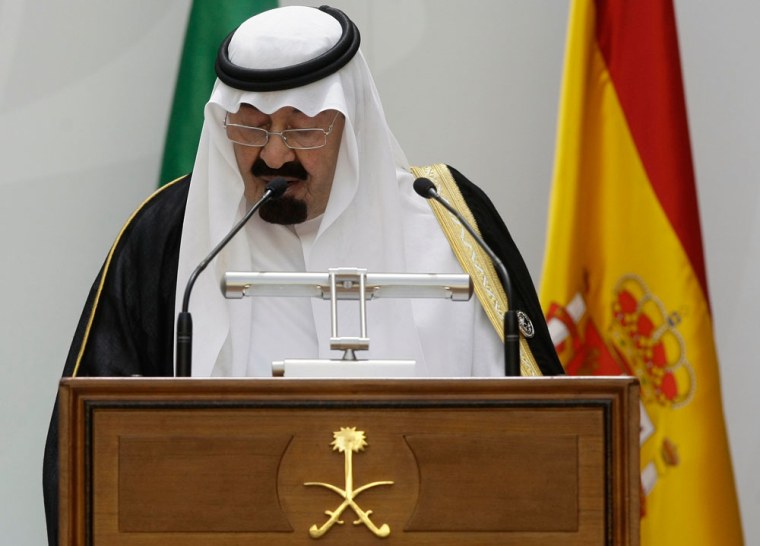King Abdullah of Saudi Arabia exhorted followers of the world's leading faiths to turn away from extremism and embrace a spirit of reconciliation, saying at the start of an interfaith conference Wednesday that history's great conflicts were not caused by religion itself but by its misinterpretation.
"My brothers, we must tell the world that differences don't need to lead to disputes," Abdullah said, speaking through a Spanish interpreter. "The tragedies we have experienced throughout history were not the fault of religion but because of the extremism that has been adopted by some followers of all the religions, and of all political systems."
Abdullah's comments came at the start of a Saudi-sponsored gathering that aims to bring Muslims, Christians and Jews closer together at a time when the world often puts the three faiths at odds.
Spanish King Juan Carlos also addressed the gathering at a ceremonial palace on the outskirts of Madrid, saying he hoped the conference would be successful.
"We have always been interested in strengthening peace, dialogue and cooperation on the international stage," he said.
The Saudis have billed the gathering — which also includes Buddhist and Hindu participants, as well as practitioners of several Eastern religions — as a strictly religious affair. There's to be no mention of hot-button issues such as the war in Iraq, the Israeli-Palestinian conflict, Iranian nuclear ambitions or rising oil prices.
Other than the inaugural session, the conference was off limits to journalists, and even getting official confirmation of the event schedule proved difficult. Saudi embassy officials referred questions to a Spanish public relations company helping to organize the meeting, while the public relations company directed reporters to the embassy.
Saudi tolerance questioned
Detractors say the Saudis are the last people who should be hosting a meeting on religious tolerance.
Wahhabism — the strain of Sunni Islam that is practiced in Saudi Arabia — is considered one of the religion's most conservative. Observers say the conference is being held in Spain partly because it would be politically unpalatable for Abdullah to allow Jewish and Christian leaders on Saudi soil.
Back in the kingdom, two TV stations carried the conference opening live, and stories about it were on the front page of several daily newspapers. The stories mentioned that there were participants of different backgrounds, countries and beliefs, but did not specifically mention that rabbis or priests were invited.
Still, Abdullah has made reaching out to other faiths a hallmark of his rule since taking over the oil-rich kingdom following the death of his half brother in 2005. He met with Pope Benedict XVI late last year, the first meeting ever between a pope and a reigning Saudi king.
And in June, Abdullah held a religious conference in Mecca in which participants pledged improved relations between Islam's two main branches, Sunni and Shia. At that meeting, Abdullah also rejected extremism, saying that Muslims must present Islam's "good message" to the world.
The three-day Madrid conference boasts a number of Jewish religious figures, including David Rosen, a prominent Irish-Israeli rabbi whose presence is being hailed as a sign the Saudis are serious about reaching out.
Rosen, however, is not listed as an Israeli in conference literature, prompting officials in the Jewish state to question the extent of the Saudis' commitment.
Rosen, who is head of inter-religious relations at the American Jewish Committee, said the naysayers are missing the point.
"What is historic about this is that it is organized by the king of Saudi Arabia," he told the Associated Press. "To hear the king of Saudi Arabia talk about tolerance, moderation and cooperation between the religions to address contemporary challenges is quite something."
When asked what he hoped to get out of the three-day gathering, Rosen added:
"The significance of this event is the fact that it is happening. I didn't have any great expectations with regards to the intellectual content."
Controversial cast
Some other Jewish officials invited to the conference are more controversial, including Rabbi David Weiss, whose group, Neturei Karta, objects to the creation of Israel on the grounds that it violates Jewish religious law.
At a 2006 gathering in Tehran hosted by hard-line Iranian President Mahmoud Ahmadinejad, Weiss made headlines by saying the number of Jews said to have been killed in the Holocaust was inflated.
Weiss was at one point scheduled to address this week's conference, but organizers said plans have changed. It was not immediately clear if Weiss would be attending the conference at all.
Also attending the opening ceremony were former British Prime Minister Tony Blair and American civil rights leader and ex-presidential candidate the Rev. Jesse Jackson.
While Spain is playing host to the conference, it has no formal role. The country considers itself a place where the three major religions once coexisted in harmony — though with rather large exceptions, including the Crusades to oust Muslims from Europe and the Inquisition, in which Jews and Muslims were persecuted and expelled.
In 2006, Spanish Prime Minister Jose Luis Rodriguez Zapatero and his Turkish counterpart launched a program called the Alliance of Civilizations, which was meant to foster better understanding between the West and Muslim countries.
